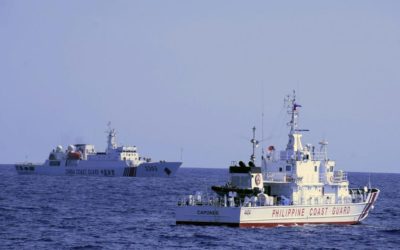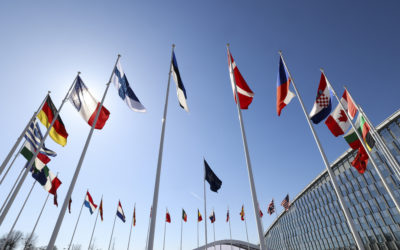Over the past few months, the Philippine Coast Guard (PCG) has expanded its responsibilities beyond its usual task of patrolling the West Philippine Sea, the portion of the South China Sea claimed by Manila. The PCG has now taken on the role of exposing the unlawful activities of both the China Coast Guard (CCG) and alleged Chinese Maritime Militia (CMM). This new responsibility came about following an incident in February, where the CCG used a military-grade laser against a 44-meter PCG vessel that was supporting the resupply mission of the Armed Forces of the Philippines (AFP).
How can Japan balance deterrence and diplomacy with China?
How can Japan balance deterrence and diplomacy with China?
How can Japan balance deterrence and diplomacy with China?
On 16 December 2022, the Japanese government approved three new strategic documents related to national security: the National Security Strategy (NSS), National Defense Strategy and Defense Buildup Program. In the nine years since the enactment of the previous NSS, the most significant changes for Japan have been the growing military threat from China and military tensions in the Taiwan Strait.
In response to the evolving security situation in the region, Japan should seek to enhance its deterrence against China and simultaneously engage with China through diplomatic efforts.
In the previous NSS, published in 2013, China’s external posture was described as ‘an issue of concern for the international community’. Since China–Taiwan relations were stable at the time, the situation in the Taiwan Strait was described as having ‘both orientations towards stability and potential instability’.
The new strategy, though, describes China’s growing presence in the region as ‘a matter of serious concern’ and Japan’s ‘greatest strategic challenge’, although the use of the word ‘threat’ was avoided. The situation in the Taiwan Strait was also described as being the source of rapidly mounting ‘concerns’, ‘not only in the Indo-Pacific region including Japan, but also in the entire international community’.
The recommendation in the new NSS that the Japan Self-Defense Forces (SDF) acquire a counterstrike capability is intended to deter not only the traditional threat of a nuclear missile strike by North Korea, but also China’s attempts to change the status quo by force in the region surrounding Japan.
This proposal does not mean that Japan has abandoned its previous exclusively defence-oriented policy. The new strategy also clearly states that it is premised on Japan’s long-standing alliance with the United States, and that its primary focus will be on improving deterrence. But this is still a significant shift in Japan’s post-war security policy and demonstrates the extent of the Japanese government’s concerns regarding the current security situation in the region.
The SDF plans to expand its stockpile of long-range missiles like the Type 12 Surface-to-Ship Missiles and acquire new BGM-109 Tomahawk Missiles — that would constitute counterstrike capabilities. This capability will be deployed with a particular emphasis on Japan’s Southwest islands, a group of islands connecting Kyushu to Taiwan. Chinese vessels have been active in the area, particularly in the waters surrounding the Senkaku Islands.
Chinese military activities in the sea and airspace surrounding Taiwan have also become more frequent since 2016. While Japan’s proposed capabilities remain asymmetrical to China’s nuclear and missile capabilities, Japan aims to strengthen its deterrence against China in cooperation with the United States.
If a direct military conflict were to occur between Japan and China over the Senkaku Islands, or if an attack on Japanese territory were to accompany China’s military invasion of Taiwan, Japan would likely consider using force against China as a matter of self-defense.
If the Japanese government determined any other situation to be an ‘existential crisis’ for Japan, Japan would likely consider using force against China to exercise its right of collective self-defense. According to the 2015 Legislation for Peace and Security, an ‘existential crisis’ is an armed attack against another country that has a close relationship with Japan ‘and as a result threatens Japan’s survival and poses a clear danger to fundamentally overturn its nationals’ right to life, liberty, and pursuit of happiness’. If US forces involved in defending Taiwan were being attacked, it would constitute an ‘existential crisis’ for Japan.
Japan’s possession of a counterstrike capability would increase the costs associated with a potential Chinese offensive in the region. Japan would exercise its right to self-defense if China were to conduct military operations in the East China Sea or the Taiwan Strait. This situation would raise the possibility of a counterattack on China’s missile bases or naval vessels. But as has been raised in Japanese domestic debates over the issue, there would still be many challenges for the Japanese government and the SDF in responding to such a situation.
Alongside strengthening Japan’s defence and deterrence capabilities, including its counterstrike capabilities, the Japanese government should stress the importance of peace and stability in the region through its diplomacy. In the new NSS, diplomatic capabilities are listed as Japan’s top strategic priority. Confidence-building dialogue with China, including on issues of concern, is an essential part of Japan’s diplomatic agenda along with the strengthening of the US–Japan alliance and an increase in cooperation with like-minded countries in the Indo-Pacific region.
On China–Taiwan relations, the new NSS states that Japan’s relationship with Taiwan has been maintained through a non-governmental working relationship based on the Japan–China Joint Communique that was signed in 1972. Although it positions Taiwan as ‘an extremely important partner and a precious friend of Japan’, it stresses that ‘Japan’s basic position regarding Taiwan remains unchanged’.
Japan should emphasize this diplomatic position to China while seeking to find a balance between strengthening deterrence and encouraging dialogue to avoid a Taiwan contingency.
Republished from the East Asia Forum under a Creative Commons License in the United States in order to point Indo-Pacific warfighters and national security professionals to reputable and relevant war studies literature. Read the original article.

Madoka Fukuda is Professor of International Politics and China Studies at the Department of Global Politics, Faculty of Law, Hosei University.
Related Articles
Balikatan 23 Features New Marine Littoral Force in First Major Joint Exercise
The Marine Corps is ready to use its new formation developed for the island-to-island fight of the future in a major joint exercise in the Indo-Pacific for the first time.
After conducting a service-level exercise in California and Arizona earlier this year, the Marine Corps will now scale that experimentation to the naval and joint force level during exercise Balikatan in the Philippines.
Finland, NATO and the evolving new world order – what small nations know
In the world of geopolitics, great powers make, break and play by their own rules. Smaller states largely have to make do with adjusting to the world as determined by others.
Which is why the decision by Finland – a country of just 5.5 million people, noted for decades as a neutral presence in Europe – to join NATO is so important. It underscores just how the Russian invasion of Ukraine has upset global realities long thought settled, at least by the Western powers.



